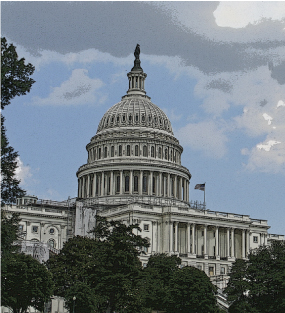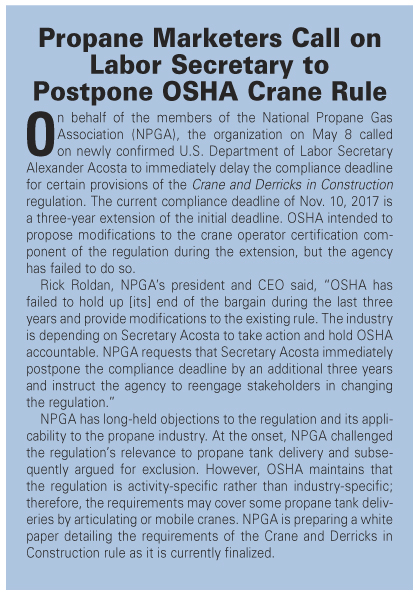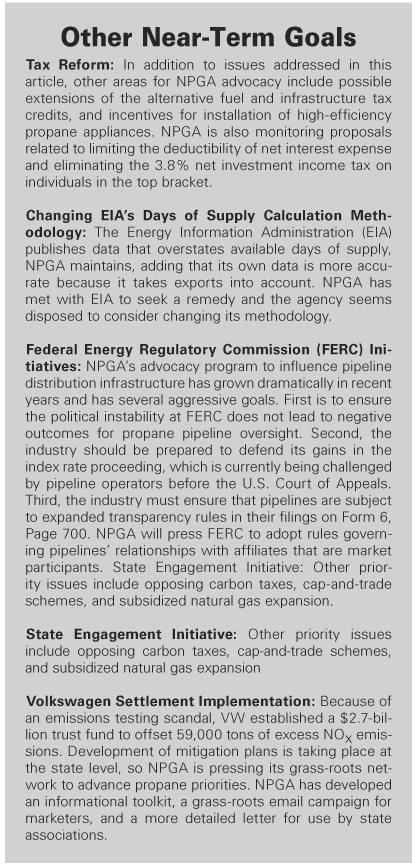Monday, June 19, 2017
(June 19, 2017) — Tax reform, winter propane supply, and a crane rule deadline extension are three issues the propane industry plans to bring up with lawmakers at Propane Days, June 19 to 21, according to an “Issue Sneak Preview” that the National Propane Gas Association (NPGA) released at its Southeastern Convention in Nashville this past April. 
“But the one that I think is the sharpest issue and the one that we’re going to have the most focused request on is the crane rule, and that’s a rule that was published by OSHA [the U.S. Occupational Safety and Health Administration] back in 2010, to require third-party certification of crane operators,” said Phil Squair, NPGA’s senior vice president of public and governmental affairs. “That’s going to cost companies a lot of money to get that kind of certification for people who are using cranes.”
In 2014, OSHA extended the compliance deadline of the crane rule to November 2017. After hearing the propane industry’s complaints three years ago, OSHA promised to offer some alternative requirements to address the propane industry’s concerns. But the administration sat on its hands and has not offered alternatives, Squair stated. The slow transition between the Obama and Trump presidential administrations has added to the problem.
“We’re going to go back up to Capitol Hill and say, ‘Congress, first and foremost, please help us push this compliance deadline back, and second, please help us obtain a program of self-certification instead of third-party certification.” Squair noted that the Propane Education & Research Council (PERC) offers a crane training curriculum, which would be better for the industry than the third-party certification that OSHA is prescribing. “It would certainly be a lot more efficient. We’re going to put a lot of emphasis on the crane rule, because if I heard it once, I heard it a hundred times in Nashville that this issue is really on top of people’s minds as something they’re worried about.”
Tax reform is another issue that the propane industry will discuss with legislators at Propane Days. NPGA notes that as part of the Republican agenda for this year, Congress is looking for the first major overhaul of the nation’s tax code in 30 years. Squair described the tax reform document House Republicans released in June as a blueprint that expressed various tax reform ideas in conceptual terms.
Squair noted that the document was written as a statement of principles rather than legislative language. But after Donald Trump won the presidential election, the House began working to make the plan into a governing document.
“What we’ve been seeing is a dance back and forth between the people who are finding a lot of good things in there as opposed to some things that aren’t so good,” Squair said. Eighty to 90% of the blueprint contains positive ideas for the propane industry, he added, such as reducing business tax rates and eliminating the estate tax.
But the propane industry is concerned about the border adjustment tax that is part of the plan, which Squair said calls for a tax on imports but not exports. He heard attendees at the Southeastern event in Nashville express sensitivity toward the issue of taxing propane imports, especially from companies that buy a substantial amount of propane from Canada.
NPGA representatives have expressed concerns to the U.S. House Ways and Means Committee about the border adjustment tax and have told committee members they should think twice about taxing imports of propane.
Regarding those discussions, Squair stated that NPGA has tried to be supportive of most of the tax code overhaul document, separating the association’s concerns about the border adjustment tax from the positive tax rate and estate tax aspects of the document.
“Overall, it would probably be a pretty good plan for [the propane industry],” Squair said. “But the devil’s always in the details,” he added, noting that more Democrats are in Congress than last year, so some challenges should be coming.
“Tax reform is a hard thing. That’s why it’s taken 30 years since the last time this has happened. I think we’re in a pretty good place to move tax reform forward. You have an administration that’s supportive. You have majorities on both the House and Senate side that are supportive. So hopefully we can get some good legislation through.”
If Congress makes progress on tax reform around the time of Propane Days, that would be helpful. Squair noted that NPGA usually tries to focus on a variety of issues at Propane Days, because not everyone has the same concerns. The association attempts to bring up issues that are topical for legislators. If legislators have been discussing certain topics and the propane industry brings up issues that are not on their radar or timely, the industry won’t make much progress. “They may be supportive and give advice…but generally speaking, we really try very hard to pick issues that may be on the top of their minds as well as on the top of our minds. We’ve been pretty good at that over the years.”
Squair believes that a third issue that the industry plans to bring up at Propane Days — a winter supply outlook —needs to be at the top of legislators’ minds. Many of them remember the “polar vortex” extreme 2013-2014 winter weather that resulted in widespread propane supply glitches. Conversely, NPGA notes that the winter of 2016-2017 was “one of the warmest America has experienced in recent years.”
Despite that, in April NPGA reported in the Issue Sneak Preview that its Inventory Trends Analysis showed that propane inventories were approaching 20 days of supply, which is considered critically low. The association adds that increased exports are the reason for the drawdown, pointing out that more than 50% of the country’s domestic propane supply is now being exported. In previous years, increased production kept pace with increased exports. But the level of exports now exceeds even the ever-increasing record-high propane production.
Squair notes that the propane industry needs a strong summer build to have an adequate number of days of supply for American consumers next winter. The association plans to tell legislators they can work with existing law and make new proposals to make infrastructure for moving propane around the country even better. NPGA might even come up with proposed legislation of its own.
“We’re not there yet, but we’ve got some ideas about hours of service, the Jones Act, LIHEAP [Low Income Home Energy Assistance Program], [and] EIA notifications of data…that would be helpful so that if inventories don’t build back the way we think they [should], the infrastructure would not be overly burdened by unnecessary rules.”

“But the one that I think is the sharpest issue and the one that we’re going to have the most focused request on is the crane rule, and that’s a rule that was published by OSHA [the U.S. Occupational Safety and Health Administration] back in 2010, to require third-party certification of crane operators,” said Phil Squair, NPGA’s senior vice president of public and governmental affairs. “That’s going to cost companies a lot of money to get that kind of certification for people who are using cranes.”
In 2014, OSHA extended the compliance deadline of the crane rule to November 2017. After hearing the propane industry’s complaints three years ago, OSHA promised to offer some alternative requirements to address the propane industry’s concerns. But the administration sat on its hands and has not offered alternatives, Squair stated. The slow transition between the Obama and Trump presidential administrations has added to the problem.
“We’re going to go back up to Capitol Hill and say, ‘Congress, first and foremost, please help us push this compliance deadline back, and second, please help us obtain a program of self-certification instead of third-party certification.” Squair noted that the Propane Education & Research Council (PERC) offers a crane training curriculum, which would be better for the industry than the third-party certification that OSHA is prescribing. “It would certainly be a lot more efficient. We’re going to put a lot of emphasis on the crane rule, because if I heard it once, I heard it a hundred times in Nashville that this issue is really on top of people’s minds as something they’re worried about.”

Tax reform is another issue that the propane industry will discuss with legislators at Propane Days. NPGA notes that as part of the Republican agenda for this year, Congress is looking for the first major overhaul of the nation’s tax code in 30 years. Squair described the tax reform document House Republicans released in June as a blueprint that expressed various tax reform ideas in conceptual terms.
Squair noted that the document was written as a statement of principles rather than legislative language. But after Donald Trump won the presidential election, the House began working to make the plan into a governing document.
“What we’ve been seeing is a dance back and forth between the people who are finding a lot of good things in there as opposed to some things that aren’t so good,” Squair said. Eighty to 90% of the blueprint contains positive ideas for the propane industry, he added, such as reducing business tax rates and eliminating the estate tax.
But the propane industry is concerned about the border adjustment tax that is part of the plan, which Squair said calls for a tax on imports but not exports. He heard attendees at the Southeastern event in Nashville express sensitivity toward the issue of taxing propane imports, especially from companies that buy a substantial amount of propane from Canada.
NPGA representatives have expressed concerns to the U.S. House Ways and Means Committee about the border adjustment tax and have told committee members they should think twice about taxing imports of propane.
Regarding those discussions, Squair stated that NPGA has tried to be supportive of most of the tax code overhaul document, separating the association’s concerns about the border adjustment tax from the positive tax rate and estate tax aspects of the document.
“Overall, it would probably be a pretty good plan for [the propane industry],” Squair said. “But the devil’s always in the details,” he added, noting that more Democrats are in Congress than last year, so some challenges should be coming.

“Tax reform is a hard thing. That’s why it’s taken 30 years since the last time this has happened. I think we’re in a pretty good place to move tax reform forward. You have an administration that’s supportive. You have majorities on both the House and Senate side that are supportive. So hopefully we can get some good legislation through.”
If Congress makes progress on tax reform around the time of Propane Days, that would be helpful. Squair noted that NPGA usually tries to focus on a variety of issues at Propane Days, because not everyone has the same concerns. The association attempts to bring up issues that are topical for legislators. If legislators have been discussing certain topics and the propane industry brings up issues that are not on their radar or timely, the industry won’t make much progress. “They may be supportive and give advice…but generally speaking, we really try very hard to pick issues that may be on the top of their minds as well as on the top of our minds. We’ve been pretty good at that over the years.”
Squair believes that a third issue that the industry plans to bring up at Propane Days — a winter supply outlook —needs to be at the top of legislators’ minds. Many of them remember the “polar vortex” extreme 2013-2014 winter weather that resulted in widespread propane supply glitches. Conversely, NPGA notes that the winter of 2016-2017 was “one of the warmest America has experienced in recent years.”

Despite that, in April NPGA reported in the Issue Sneak Preview that its Inventory Trends Analysis showed that propane inventories were approaching 20 days of supply, which is considered critically low. The association adds that increased exports are the reason for the drawdown, pointing out that more than 50% of the country’s domestic propane supply is now being exported. In previous years, increased production kept pace with increased exports. But the level of exports now exceeds even the ever-increasing record-high propane production.
Squair notes that the propane industry needs a strong summer build to have an adequate number of days of supply for American consumers next winter. The association plans to tell legislators they can work with existing law and make new proposals to make infrastructure for moving propane around the country even better. NPGA might even come up with proposed legislation of its own.
“We’re not there yet, but we’ve got some ideas about hours of service, the Jones Act, LIHEAP [Low Income Home Energy Assistance Program], [and] EIA notifications of data…that would be helpful so that if inventories don’t build back the way we think they [should], the infrastructure would not be overly burdened by unnecessary rules.”

